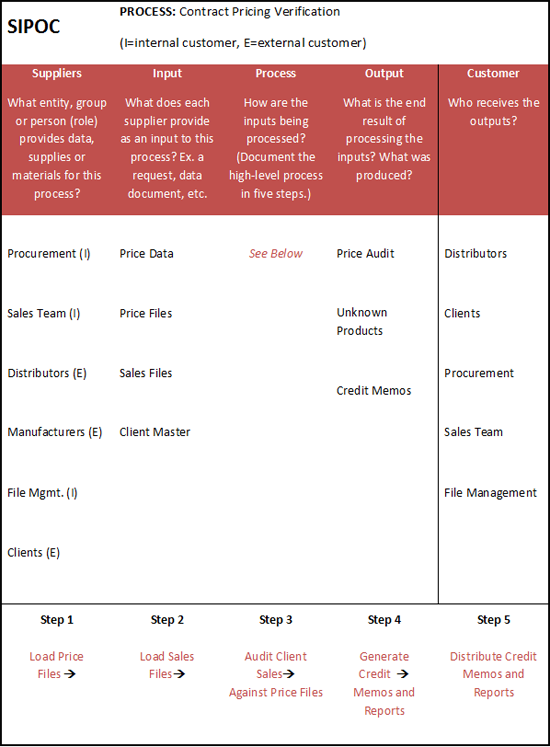The Four Agreements You Need to Have a Successful Process Mapping Session
Process mapping is a group exercise in which teams of subject matter experts (SMEs) gather to determine how work gets done. Step-by-step diagrams are drawn to document the who, what, when and how a business task is performed. Teams utilize process mapping as a way of finding opportunities for improvement, increasing transparency between groups, and understanding the roles of systems in processes.
The results of process mapping can inform strategic plans and change the course of an entire organization. However, to yield those results facilitators must first learn to establish rapport with teams and make four critical agreements to ensure success. Process mapping sessions without these agreements almost always yields poor results leaving participants weary of the value of the exercise. These four agreements will help to ensure that your efforts will not be in vain.
- Believe That Change Is Necessary – Process mapping teams must believe that there is a need for change in order to gain commitment and rally support for holding a mapping session. If there is no support for change, it will be very difficult to convince SMEs to spend time documenting their work – publicly.
Business improvement projects often require making a case for change to win cross-functional support. You will need to do the same for launching a cross-functional process mapping session to ensure effective participation from SMEs, eliminate suspicion, and create interest and advocacy for the effort. Here are some recommendations for making a strong case for change:
- State the problem/suspicion and how its connected across organizations
- Demonstrate urgency with preliminary data and metrics
- State the potential consequences for not investigating problems
The case for change must be shared with SMEs and all interested parties to win continued support for the effort.
- Be Transparent, Engaged and Committed – Gathering SMEs for participation in the mapping session may require a significant amount of time and commitment. You will be asking co-workers and/or teams to take time out of their busy schedules to identify exactly what they do, how they do it and take responsibility for whatever is revealed.
This request can be met with either a readiness for change or fear that potential improvements could leave job roles vulnerable. Without open and honest communications you will most likely face resistance from those who fear change and at best obtain an intermittent level of participation from your SMEs.
Being transparent about the need for change and establishing upfront the level of commitment and engagement required will help to ease those concerns. Follow these four steps to win over SMEs:
- Conduct an information session to present the case for change and explain how the mapping process works.
- Discuss the amount of time that will be needed to document and create the process maps.
- Negotiate the best times for the mapping session with participants so that they will be better able to manage competing priorities and be fully engaged.
- Agree that data and findings are to be used as a tool for discussion and improvement rather than as a weapon to point fingers and place blame.
- Make Sure Everyone Has A Voice – Bringing the right people to the table and allowing those people to be heard are critical to ensuring that a complete and accurate process is documented. We can often figure out at a high-level the departments or groups that are involved in a process, however, we don’t always know the details of how a process works and/or what person, group or team may be involved. Identifying SMEs to invite to a process mapping session can be ambiguous, however, using the SIPOC tool from the Six Sigma discipline can help shed some light.
SIPOC is an acronym for Supplier, Input, Process, Output and Customer. It can be seen as a high-level process map that is typically used to understand the purpose and scope of a process prior to the launch of a process improvement project. It is also an excellent way to identify key players for the mapping session. Brainstorm with a small team and complete the SIPOC by asking questions about each of the acronyms and answering them. See Table 1 as an example.
Table 1 – SIPOC for Contract Pricing Verification

Note: External suppliers and customers are not required participants in the typical process mapping session. Often the goal is to document internal processes. However, in order to understand the role and activities of the external supplier and customer, liaisons are often invited to the mapping session where they will be able to provide input and share outcomes in support of necessary changes.
Based on the results of the Contract Pricing Verification SIPOC provided in Table 1 we learn which internal suppliers and customers are imperative to invite as key participants. We also identified stakeholders who may be able to provide additional insight into the process. Overall, you will be able to assemble a good team that will provide a good 360 degree view of the process.
- Put Your Name On It – SMEs must validate the process maps to prove that each participant was present, engaged, and stands behind their contributions. Validation confirms that the process maps are accurate and represent the current or desired future state process. Process maps without this validation hold little weight and leaders may be hesitant to rely on them for decision making in process improvement initiatives.
Obtain a sign-off from each SME and/or PO during the review process by asking them to send an email or electronic signature confirmation that they have read the maps and that their roles and activities are accurately depicted.
In summary, the results of an effective process mapping session can be rewarding and uncover unnecessary waste that can lead to great efficiency across your organization. Obtaining these four agreements prior to the launch of a process mapping session will help to ensure that you realize the benefits from the exercise. Happy mapping!

















